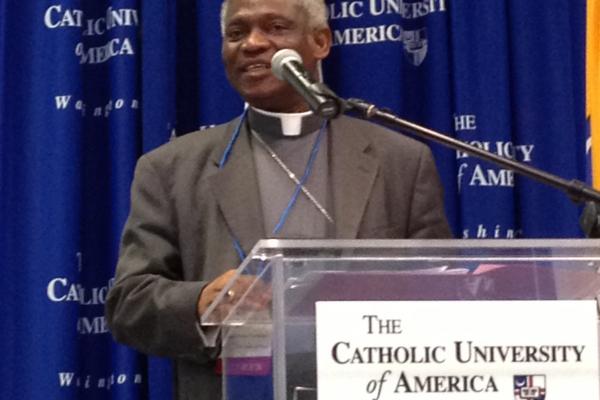On April 11, 1963 Pope John XXIII published an encyclical some initially dismissed as naive and myopic, as too liberal and too lofty. But today, his "Pacem in Terris" is generally lauded as genius and prophetic – well ahead of its time on the issues of human rights, peace, and equality.
As Maryann Cusimano Love, a Catholic professor of international relations, notes, the same year “Pacem in Terris” was published, spelling out the theological mandate for political and social equality for all people, women in Spain were not allowed to open bank accounts, Nelson Mandela was standing trial for fighting apartheid, and Walter Ciszek was serving time in a Soviet gulag simply for being Catholic.
On Monday and Tuesday, the Catholic Peacebuilding Network hosted a two-day conference at the Catholic University of America, commemorating 50 years since the publication of "Pacem in Terris.”
Catholic theologians and activists, as well as State Department officials, spoke about the long-lasting impact John's encyclical has had on evangelism and justice, and how it should direct foreign policy today.
In the conference’s opening statements, Dr. Rev. William Headley, founding dean of the Joan B. Kroc Institute of Peace Studies at the University of San Diego, described the encyclical as a “living document that remains vital today.”
Many of the conference speakers noted how the encyclical, at its core, is a call to serve the common good. And it was clear – throughout the conference – that for both speakers and attendees, this call to the common good was of the utmost importance.
For example, during a Monday session, Kevin Appleby, the director of the U.S. Conference of Catholic Bishops’ Office of Migration and Refugee Policy, and Mark Ensalaco, a political science professor at the University of Dayton, laid out the statistics on human trafficking. When they finished, a nun in the audience stood up and announced her outrage that she had never heard a homily on the issue modern slavery when the issues was clearly so prevalent.
On Tuesday, Douglas Roche, the former Canadian ambassador for disarmament, gave a fiery speech decrying nuclear proliferation – and concluding, with a shaking voice, that nuclear weapons are a "blasphemy against God."
Later, during the question-and-answer period, casting political correctness aside, Marie Dennis demanded straight answers from a State Department official who, in his overview of American nuclear policy, had glossed over the fact that the U.S. has still not signed the Comprehensive Test Ban Treaty.
But while there was certainly room for indignation, there was also room for optimism and hope – especially in regard to the new pope.
On Tuesday, Ghana’s Cardinal Peter Turkson, president of the Pontifical Council for Justice and Peace, spoke about the legacy of “Pacem in Terris,” and noted how Pope Francis’ expressed concern for the poor makes him a true “Pacem in Terris” pope.
“[Francis’ value system] seems to fit perfectly with the spirit of Blessed John XXIII, whom this important conference was to honor with the greatest gratitude and the greatest respect,” Turkson said.
In an earlier session, John Carr, the former director of the U.S. Bishops’ Department of Justice, Peace, and Human Development, commended Pope Francis for his Holy Thursday decision, which garnered vocal agreement from the audience.
The final session of the conference focused on “the way forward,” which everyone seemed to agree was a more intentional and universal adherence to the teachings of “Pacem in Terris” in the ways Christians relate to their world.
“If we got our act together,” said Carr, “we’d be dangerous.”
Dawn Araujo is editorial assistant at Sojourners.
Got something to say about what you're reading? We value your feedback!
